Just Call Me Lonesome may refer to:
Just Call Me Lonesome may refer to:

John J. Mellencamp, previously known as Johnny Cougar, John Cougar, and John Cougar Mellencamp, is an American singer-songwriter. He is known for his catchy brand of heartland rock, which emphasizes traditional instrumentation.

Donald Eugene Gibson was an American songwriter and country musician. A Country Music Hall of Fame inductee, Gibson wrote such country standards as "Sweet Dreams" and "I Can't Stop Loving You", and enjoyed a string of country hits from 1957 into the mid-1970s.

Radney Muckleroy Foster is an American country music singer-songwriter, musician and music producer. Initially a songwriter in Nashville, Tennessee, Foster made his recording debut as part of the Foster & Lloyd duo, recording three studio albums and with nine singles on the country charts.

The Lonesome Jubilee is the ninth studio album by American singer-songwriter John Mellencamp, credited as John Cougar Mellencamp. The album was released by Mercury Records on August 24, 1987. Four singles were released from the album, the first two in 1987 and the last two in 1988.
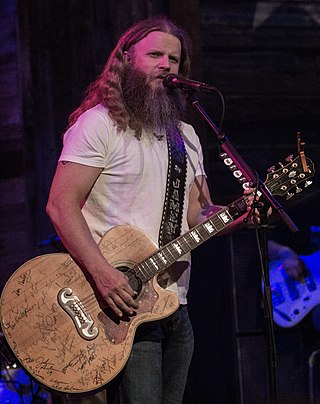
Jamey Johnson is an American country music singer and songwriter.
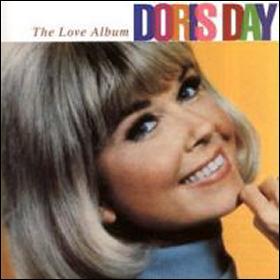
The Love Album is an album compiled from tracks recorded by Doris Day during three studio sessions arranged and conducted by Sid Feller in Hollywood in 1967, but not released until 1994.
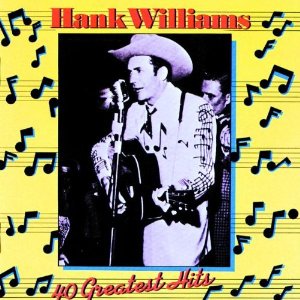
40 Greatest Hits is a two-record greatest hits compilation by American singer-songwriter Hank Williams. It was released in 1978 by Mercury Records – who under PolyGram became responsible for the MGM tape vault – on the 25th anniversary of Williams' death. Significantly, it was the first anthology in quite some time that did not subject Williams' recordings to either rechanneled stereo, posthumous overdubs, artificial duets with family members, or most or all of the above. Because of both this, and the value-for-money attraction of having a deeper song selection than single-disc compilations issued previously by MGM Records, many reviewers consider this anthology to be the perfect starting point for newcomers to Williams' recorded legacy. The album remains, to this day, the best-selling record of Williams' career.

George Jones Sings the Great Songs of Leon Payne is an album by American country music artist George Jones, released in 1971 on the Musicor Records label containing nine Leon Payne covers and one Jones co-write with Payne, "Take Me". Eight of the ten songs on this album had been released on earlier Jones albums. Of those eight, three were re-recorded in 1970 and included here, and the other five are just re-releases of the original 1960s recordings. The two previously unreleased songs, "Brothers of a Bottle" and "Lifetime to Regret", were also recorded in 1970. This was the last Jones "studio" album that was released by Musicor as he had already signed with Epic Records.

"Oh Lonesome Me" is a popular song written and recorded in December 1957 by Don Gibson with Chet Atkins producing it for RCA Victor in Nashville. Released in 1958, the song topped the country chart for eight non-consecutive weeks. On what became the Billboard Hot 100, it peaked at No. 7. It was Gibson's only Top 10 hit on the pop chart. Its B-side was "I Can't Stop Loving You", which peaked at No. 7 on the C&W Jockey charts and became a standard song about unrequited love. The vocal backings on both songs were provided by the Jordanaires.

The Head Cat is an American rockabilly supergroup formed by vocalist/bassist Lemmy, drummer Slim Jim Phantom and guitarist Danny B. Harvey. Lemmy died in 2015 and as of 2017, former Morbid Angel member David Vincent took Lemmy's place as vocalist and bassist.

I'm a Lonesome Fugitive is the third studio album by Merle Haggard and The Strangers released on Capitol Records in 1967.
"Forever Together" is a song co-written and recorded by American country music artist Randy Travis. It was released in September 1991 as the second single from his album High Lonesome. It peaked at number 1 on both the Billboard Hot Country Singles & Tracks and the Canadian RPM country Tracks chart. It was co-written by Travis with fellow musician, Alan Jackson while they were on tour together.

Just Call Me Lonesome is an album by American country singer Ernest Tubb, released in 1963.
"Just Call Me Lonesome" is a song written by Rex Griffin and first recorded by Eddy Arnold in 1955, when it reached number two on the U.S. country singles chart. "Just Call Me Lonesome" subsequently appeared on albums by numerous recording artists:

Are You Ready for the Big Show? is the fourth album by American country music singer Radney Foster. It was released in 2001 for Dualtone Records. It is a live album, featuring re-recordings of Foster's past songs, including his first two singles, "Just Call Me Lonesome" and "Nobody Wins". Also included as a hidden track is "Texas in 1880", which Foster originally released in 1988 as one-half of Foster & Lloyd.
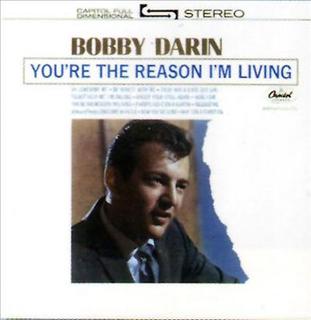
You're the Reason I'm Living is a 1963 album by Bobby Darin. It contains Country and Western music, often with a big band twist, and features arrangements by Jimmie Haskell, Shorty Rogers and Gerald Wilson. The title track was a number three hit single. The album reached number 43 on the Billboard 200 chart.
"You're Gonna Make Me Lonesome When You Go" is a song by Bob Dylan. Recorded in September 1974, it appeared as the fifth track on Dylan's album Blood on the Tracks, released in January 1975.
"Sail Along, Silv'ry Moon" is a song written by Harry Tobias and Percy Wenrich in 1937 and performed by Bing Crosby. It reached #4 on the U.S. pop chart in 1937. Outside of the US, the song peaked at #1 in Canada, Germany and Norway.

Copy That is a studio album by American country artist Sara Evans. The album was released on May 15, 2020 via Born to Fly Records and was produced by Jarrad K. The project was Evans's tenth studio recording and her first album to consist entirely of covers material. A collection of thirteen songs were chosen for the album and it included two additional artists on the album.
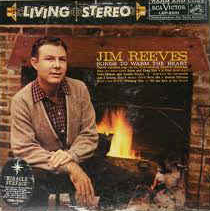
Songs to Warm the Heart is an album recorded by Jim Reeves and released in 1959 on the RCA Victor label. The album was produced by Chet Atkins. The cover photograph was by Don Cravens, and the liner notes were written by Don Richardson.